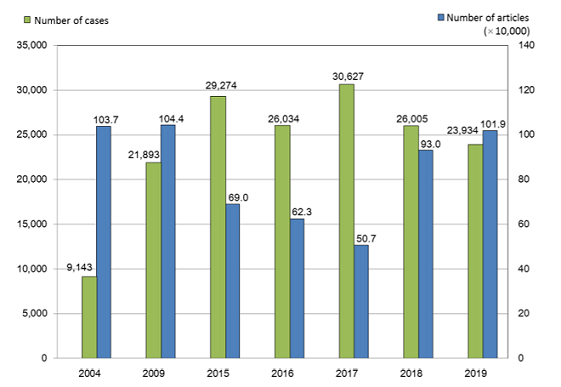June 3, 2021
Trademark News
Revision of the Trademark Act of Japan in 2021:Japan to Enhance Border Enforcement Against Counterfeit Goods
On May 14, the National Diet of Japan passed a bill to amend the Patent Act, etc., which includes amendments to the Trademark Act and the Design Act regarding the definition of the term “importation” in order to put the brake on increasing counterfeit goods imported into Japan. It is now amended to include an act by a person in a foreign country of having another person bring products into Japan from abroad. This amendment is expected to lead to stricter border enforcement against counterfeit goods.
Background
In recent years, while the number of cases of seizures of imported counterfeit goods at the Japanese border has been on the rise (from about 10,000 cases in 2004 to 20,000-30,000 cases in 2010s), there is not so much change in the number of seized articles (around 0.6-1 million items). In 2020, the number of cases of seizures was over 30,000 cases, whereas the number of seized articles dropped to about 0.6 million items according to the Customs and Tariff Bureau of the Ministry of Finance. Most of the them are trademark infringement cases. This situation is reportedly due to the increase of e-commerce shopping and lower international shipping charges.

Source: 2019 Seizure Statistics of IPR Border Enforcement, the Japan Customs
(https://www.customs.go.jp/mizugiwa/chiteki/pages/statistics/statistics2019.pdf)
Amendment to Trademark Act
2. Introduction of a new system of inviting third parties’ opinions in patent infringement lawsuits
Under the Japanese Trademark Act, “trademarks” are defined as what are used in connection with the goods of a person who produces, certifies or assigns the goods as a business or the services of a person who provides or certifies the services as a business (Article 2(1)). “Importation” is included in the definition of “use” (Article 2(3)(ii)). Accordingly, if counterfeit goods are imported not for commercial purposes but for personal use, such importation will not be considered as trademark infringement.
In the standard seizure procedure, when the customs office finds suspected counterfeit goods, it begins the seizing process and notifies the rights holder and the importer to inform that the seizure procedure has begun. While the rights holder can file an opinion stating that the goods are infringing goods and should not be imported into the country, the importer can argue against the seizure. If the importer argues that they intend to import the goods for personal use, it is less likely that such importation of the goods is found to constitute trademark infringement given the requirement of commercial purpose, though depending on other circumstances such as the amount of goods being too large for personal use, it could be found to constitute trademark infringement. As the cross-border e-commerce spread widely, the cases where the importer argues that their importation is for personal use and lawful increased.
In this context, the Trademark Act was amended in order to solve this situation. Specifically, an act by a person in a foreign country of having another person bring products into Japan from abroad has been included in the definition of “importation” (Article 2(7)). In general, “importation” is an act done by a person inside the country, but the act of shipping goods directly to an individual inside the country by an overseas business entity got added to one of the types of trademark infringement in this 2021 amendment while maintaining the requirement of commercial purpose.
A similar amendment was made to the Design Act at the same time.
The amended acts will be effective within 1 year and 6 months.
Importation of counterfeit goods by an individual for personal use itself is yet to be regulated in consideration of the impact on the requirement of commercial use, and there is still concern that circumvention by counterfeiters might occur. This amendment is, however, expected to lead to stricter border enforcement against counterfeit goods and will be good news for many brands.
Written by: Ms. Tomoko Honami (Attorney at Law)